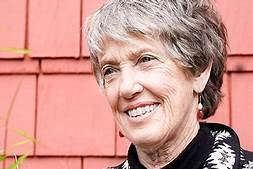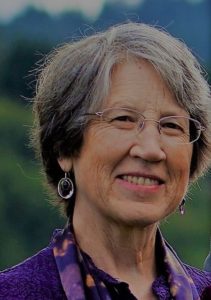Joanna Macy
 This post honours the life work of Joanna Macy. Joanna is a 90-year-old environmental activist, author, and inspiring teacher of Buddhism and deep ecology. She describes this moment in human history as The Great Turning, a revolutionary shift from an industrial growth society to a life-sustaining culture.
This post honours the life work of Joanna Macy. Joanna is a 90-year-old environmental activist, author, and inspiring teacher of Buddhism and deep ecology. She describes this moment in human history as The Great Turning, a revolutionary shift from an industrial growth society to a life-sustaining culture.
Her most recent book is A Wild Love for the World: Joanna Macy and the Work of Our Time, edited by Stephanie Kaza, published by Shambhala, April 2020. It was drawn to my attention in the Buddhist magazine Tricycle, which in turn directed me to the magazine Deep Time, which is based on Joanna’s ‘work that connects’.
Joanna, Tricycle and Deep Time are all based in the US, currently the centre of the global COVID-19 pandemic. As deaths mount, the US finds itself caught in a vice between fears of the growing death toll as the pandemic spreads across the US, and fears of the impact of an economic collapse on the fragile quality of political life, as ‘liberate’ protests mount against the physical distancing measures being enforced to control the contagion. As we witness the global pandemic and economic collapse, it has never been more apparent that the ‘business as usual’ model of our world order is being challenged. As many have noted, the current public health crisis is not entirely separate from the climate crisis—rather, both are part of a larger tapestry of global change.Despite the fear, panic, and pain that rages on in our world, Joanna Macy says that she’s lucky to be alive in this moment—because when everything starts to unravel, we have an opportunity to rediscover our deep belonging with the Earth. No voice has been as clear or as compelling as Joanna Macy’s in the intersection that lies between Buddhist practice and ecological movements.
As an environmental activist, author of eight books, and a scholar of Buddhism and deep ecology, Joanna has been on the front lines of the environmentalist movement for decades. She worked closely with Australia’s John Seed in the development of the Deep Ecology Workshops, including the Council of All Beings, whereby using experiential methods, people have rediscovered their emotional connection to the land and all its creatures as ‘fellow citizens’ of Planet Earth.
Joanna’s wide-ranging work addresses psychological and spiritual issues of the nuclear age, the cultivation of ecological awareness, and the fruitful resonance between Buddhist thought and postmodern science. The many dimensions of this work are explored in her thirteen books, which include three volumes of poetry of Rainer Maria Rilke with translation and commentary.
In the face of overwhelming social and ecological crises, her Work that Connects movement helps people transform despair and apathy into constructive, collaborative action. It brings a new way of seeing the world as our larger living body. This perspective frees us from the assumptions and attitudes that now threaten the continuity of life on Earth.A Wild Love for the World
 In this interview with Molly Brown, published in the magazine, Deep Time, March 2020, Stephanie Kaza talks about the genesis and fruition of A Wild Love for the World: Joanna Macy and the Work of Our Time, Shambhala 2020.
In this interview with Molly Brown, published in the magazine, Deep Time, March 2020, Stephanie Kaza talks about the genesis and fruition of A Wild Love for the World: Joanna Macy and the Work of Our Time, Shambhala 2020.
After much experimentation around how to organise the book, comprising contributed chapter by various writers, with the help of the publisher, Shambhala, Stephanie settled on five themes as the chapters:
- Gaia consciousness, a planetary view as foundation
- Grief work
- Interdependence—the interplay of reality
- Deep time—the nuclear guardianship project and her work in Russia
- Moving forward together—working collaboratively, not doing it alone—so essential to the work.

Stephanie Kaza —Editor of A Wild Love for the World
Stephanie Kaza is professor emerita of environmental studies at the University of Vermont and author of Green Buddhism: Practice and Compassionate Action in Uncertain Times (Shambhala, 2019).
Molly: How did you get the idea to create this book?
Stephanie: I knew Joanna was about to turn 90 and it seemed like there would be a book like this for her somewhere in the world. I have seen similar volumes for prominent people in academia that consist of thoughtful papers on the person’s academic contributions. These are sometimes called festschrifts. So that was the model I had in mind, thinking that if somebody was organizing this, I would like to write a chapter. I asked Kaye Jones what she might have heard, since I knew Joanna had recently visited with her family in Trout Lake, Washington. But as we checked around, it became clear there was no such project in the pipeline.
Kaye would probably tell the story a little differently, but I remember her suggesting in almost a mischievous way, “Maybe you might be interested in spearheading such a thing.” That wasn’t my intention in the beginning; I just wanted to write a chapter! But, together, we decided it was worth discussing with Joanna. My husband Davis and I were traveling to Vancouver, BC that August, 2018 and timed the last stop to visit Trout Lake when Joanna was at Kaye’s.
Joanna wasn’t feeling so great; she had picked up a cold and her lungs were irritated from the smoke of the terrible BC fires that year. We sat together for a few hours and just brainstormed, filling an easel pad with names of people that might contribute. We didn’t know whether any of us were ready to take this up. But we thought, let’s just see — is there any energy here around this idea? Though I had written and edited other books, I really had no idea what I might be getting into. I had just finished my Green Buddhism book with Shambhala, so I offered to run the idea by my editor and the three of us agreed to meet again in Berkeley in September.
In that next meeting, things escalated quickly. We were all checking our emergence barometers. Joanna began telling stories and it seemed that these were key epiphanies, each story an awakening to a breakthrough in philosophical, spiritual understanding that informed all the work that followed.
Very quickly, I thought that if we were going to take this up, I wanted it to get this book out while Joanna was still 90. It was a crazy goal. It was virtually impossible. But we didn’t want this to drag out for five years; it needed to just go fast. We agreed to take the next steps.
In October, I shared our starter list of potential contributors with Shambhala and received a contract offer right away. There were monthly work sessions in Berkeley with Joanna, lots of brainstorming, lots of communication, lots of editing, etc. – all aiming for the book in hand by May 2, 2020.
Molly: Can you say more about this emergence process?
Stephanie: Emergence was our byword every step of the way. We just kept meeting and listening to what was coming up as we moved forward. The epiphanies took shape with Kaye’s help while I worked with the authors. She would record Joanna’s telling of her stories, transcribe them, and review them (through multiple drafts) with Joanna, who is the fierce and scrupulous editor. We kept returning to the emergence theme of alert openness and it stood us in good stead because we didn’t really know exactly where this project would take us.
Molly: Speaking of emergence, I understand the themes changed dramatically along the way.
Stephanie: I was on a writing retreat at the Oregon coast and I knew the book had not yet “jelled.” So I went for a long walk on the beach and just thought, “Well, now what? Where do we go from here?” I came back from that walk with one thought: “five.” And I thought, “Five, there will be five sections.” That was as much as I knew. It seemed like the right number for a big book, so I trusted that as a starting point for the integration.
The next time we met in Berkeley, I asked, “What are the big ideas here? Could we organize the book around the big ideas and fold the reflections, the global reports, the applications all under the big ideas?” Joanna flipped! She loved it.
She said, “This is what I’ve been trying to communicate all along. I know people love the exercises, the activities, but I want them to think about the underlying principles and philosophy supporting the work.”
So from there we were free flowing. That was a really big emergence. We had easel pad sheets posted everywhere. We were crossing things out, moving chapters right and left. Would this go here? Could that go there? Some things fit; some things didn’t fit. It was pretty ragged. But I ran the new direction by our editor and he felt we were on the right track.
Molly: And what were the five key ideas?
Stephanie: You’ll recognize them; they overlap the Spiral quite a lot. Amazingly, three quarters of the submissions filled out these themes, enough that we could see they were going to work.
Stephanie: As we worked out the title for the book, Joanna was especially taken with the subtitle: “Joanna Macy and the Work of Our Time.” She felt that this was what the book was about. “It’s not a book looking back on my life, and telling stories about the past; it should be a book that will serve activists and thinkers going into the future for the work that needs to be done now.” This inspired her to write the Afterword reflecting her most current thoughts framing what she sees as the work of this time.
Molly: What do you find most exciting or enjoyable about the book as it’s turned out?
Stephanie: Well, this is this is my first chance to answer that question! Let me see… One delight is having Joanna’s voice in the book. This gives a sense of her presence and that adds a different kind of energy. Her epiphanies open each of the sections. They announce the topics with strong stories in her own very powerful, crisp, clean writing. The other thing I really enjoy is the range of voices. Some are a more scholarly and academic (with footnotes) and some are more personal. Some are from older people, some from younger people; there’s really a good range of perspectives that makes for a lively read.
Of course, I’m very excited about the big ideas. I am just so pleased that they emerged as a way to frame Joanna’s intellectual legacy. This will give her and the other authors a clear platform for talking about the work of our time. I’m also excited to see where the book goes, who wants to have it in their hands. Shambala staff took promotion materials to a big marketing event in Frankfort and there was a lot of interest in the book in Europe and the UK. And, of course, she has long standing students there going back thirty years and more. The global reach aspect is very exciting.
I’m really hoping this book is a springboard for the next evolution of the work. Nobody knows; it’s all emergent. We tried to engage current challenges and questions, whether on climate adaptation or issues of diversity and decolonization — all those really difficult things. This is what the work is about now. I’m eager to see what the book sparks after it comes out.
Molly: Are there any particular highlights for you as the editor?
Stephanie: Personally, two things have been a particular pleasure for me as the editor. One is the cover. We were very lucky that Shambala added a new stage in their design process soliciting input from authors. I thought, “Okay, I’m not a book designer, but I know a lot of things could be really bad.” So my husband Davis (he’s an artist) and I went to Powell’s Books and spent an hour looking at book covers. I made a list of things to avoid, such as solid red or yellow with white type which was all the rage. Then I gave Shambhala some examples of book designs that we thought would be congruent with Joanna’s perspectives and philosophy. Luckily they took many of our suggestions. Joanna is very happy with how this cover turned out.
The other thing I’m really pleased about is that we have a bibliography in the back of the book of almost everything she’s ever written, at least everything we could find! I don’t believe this has ever been put together before. Besides her books and book chapters, there are literally dozens of articles over the years. I believe someone (not me!) ought to do a major biography on her and this reference list would be a great place to start. When Joanna was hitting her stride in the 1980s and 1990s, there were a number of new magazines popping out: New Age Journal, Inquiring Mind, Yoga Journal, Tricycle, etc. She wrote articles and gave interviews to everyone, it seems, so she has quite a prolific record. It’s nice to see that all in one place.
Of course, I should add what a great joy it has been to work with all the many generous contributors and with Joanna and Kaye as a team. The authors were a never-ending source of support and inspiration across hundreds of emails and multiple versions of the manuscript. What an incredible group of people! I feel so blessed to have been able to work with them through this process. Our little team of three had many fine moments of breakthrough, celebration, and delight in being together – Joanna called this arbeitsfreudigkeit, or “work joyfulness.” That is what kept me going through the hundreds of hours of editing required to bring the book to completion.
Molly: What do you hope that readers will find in reading the book?
Stephanie: Let’s see. Well, the books about Joanna Macy that we now have in the world include her memoir, her dissertation, the facilitator guides, the Rilke translations, and the much beloved World As Lover, World as Self. To date there has been no overview of her work as it has spread widely in the world, which requires many authors. So when people read this book, they will see what a huge impact she has had on the world. She not only changed the way people experienced their grief for the world, she introduced systems thinking and Buddhist philosophy to hundreds of thousands of people around the world. She deserves credit for that. A lot of her ideas have become quite commonplace now.
The book should also provide a much deeper foundation for people familiar with her work who have trained with her over the years. I think they will feel gratified that she’s been so well honored. I think all of us want to honor her role in our own lives and share that with others out of respect and gratitude, because it is a profound thing when your whole way of thinking has been deeply influenced by such a person.
The overall emotional tone of this book project has been a sense of gratitude to Joanna and how lucky we all are that she is in the world while we are alive and can benefit from her. It is our good fortune that she is such a powerful and clear writer and speaker; her work is well communicated in her books and talks. As I edited the material, I tried to think about how this book could still be useful in 10 or 20 years, when the people in Extinction Rebellion and the Sunrise Movement are hitting their 40s and 50s and still wanting inspiration to draw on.Molly: As you speak, I think of the impact that Joanna has had on my life and my relationship with her. It is good to be in touch with that again, because it is easy to let that become background when you’re focused in on the moment. Where would my life be if I hadn’t met Joanna?
Stephanie: She’s a very big mind and I put her in my personal pantheon of “greats,” right up there with the Dalai Lama and Gary Snyder. For me it is a joy to feel I have made a full effort to do justice to her tremendous influence on the world.
Molly: Are you making plans for any book launch events?
Stephanie: Yes, yes, there is a lot on the calendar for 2020. The formal release date is April 14 and we will have a pre-reading with Northwest authors at Powell’s Books in Portland April 13 and then a super reading/party online on Joanna’s 91st birthday. It should be very high energy!
Molly: Where can people learn more about the book?
Stephanie: You can go to the Shambhala website and browse through the table of contents and first introductory material, including the foreword as well as one of Joanna’s pieces. We encourage readers to pre-order books if they are interested, since this will give Shambhala some idea of how the book will be taking off. We hope you enjoy these wonderful reflections and reports from the field on Joanna’s lifework and global legacy!For more info, see https://www.shambhala.com/a-wild-love-for-the-world.html
Online book launch and birthday celebration, May 2nd at 5pm Pacific time. Please save the date on your calendar, and check the link below for further details: https://www.shambhala.com/events/a-wild-love-for-the-world-book-launch-party-with-joanna-macy/

![Call of the Dakini | A Memoir of a Life Lived [Extract]](https://regenesis.org.au/wp-content/uploads/2023/08/Catalogue-OF-Articles-by-Barbara-Lepani-July-2018-July-2023-.jpg)
Recent Comments